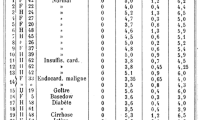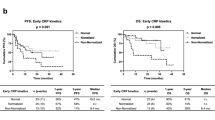Abstract
Background
We carried out this study to evaluate the association between regulatory T cells (Treg) and prognosis and progression after cryoablation in patients with hepatitis-B virus-related hepatocellular carcinoma.
Methods
Peripheral Treg frequency in 111 patients with hepatocellular carcinoma (HCC) was detected by flow cytometry. Treg frequency and function were re-examined during patient follow up. A possible association between Treg and α-fetoprotein (AFP) was also analyzed, and the distribution of resident CD4+ and CD8+ T cells and FoxP3+ T cells in the liver tissue of patients with HCC was examined by immunohistochemistry.
Results
Treg frequency significantly increased with disease progression. Our longitudinal study showed that Treg frequency had significantly decreased in 17 patients with HCC regression following cryoablation, but the frequency had dramatically increased in 14 patients with HCC recurrence or progression. Furthermore, AFP levels varied in a way comparable with Treg frequency in patients with elevated AFP recorded before therapy. Significantly increased suppressive effects of Treg on proliferation and cytokine secretion of CD8+ and CD4+ T cells were observed during follow up in patients with tumor progression, but not in patients with tumor response. Moreover, the numbers of CD8+, CD4+, and FoxP3+ cells infiltrating the tumors around the cryotherapeutic zones were significantly decreased after argon–helium cryoablation, and this was associated with a reduction in the FoxP3/CD8 ratio. Importantly,increased quantities of circulating CD4+CD25+FoxP3+ Treg and tumor infiltrating FoxP3+ cells before cryoablation were associated with high recurrence or risk of progression in HCC patients after cryoablation.
Conclusions
Treg variation is associated with tumor regression or progression in HCC following cryoablation and may be used as a marker to estimate HCC progression.





Similar content being viewed by others
Abbreviations
- APC :
-
Allophycocyanin
- PerCP:
-
Peridinin chlorophyll protein
- FITC :
-
Fluorescein isothiocyanate
- PE :
-
Phycoerythrin
- Treg :
-
Regulatory T cells
- AFP :
-
α-Fetoprotein
- PBMC :
-
Peripheral blood mononuclear cell
- HCC :
-
Hepatocellular carcinoma
- TR :
-
Tumor response
- TP :
-
Tumor progression
References
Parkin DM, Bray F, Ferlay J, Pisani P. Estimating the world cancer burden: Globocan 2000. Int J Cancer. 2001;94:153–6.
Jemal A, Murray T, Ward E, Samuels A, Tiwari RC, Ghafoor A, et al. Cancer Statistics, 2005. CA Cancer J Clin. 2005;55:10–30.
Gage AA. History of cryosurgery. Semin Surg Oncol. 1998;14:99–109.
Zhou L, Yang YP, Feng YY, Lu YY, Wang CP, Wang XZ, et al. Efficacy of argon-helium cryosurgical ablation on primary hepatocellular carcinoma: a pilot clinical study. AiZheng. 2009;28:45–8.
Yantorno C, Soanes WA, Gonder MJ, Shulman S. Studies in cryo-immunology I: the production of antibodies to urogenital tissue in consequence of freezing treatment. Immunology. 1967;12:395–410.
Shulman S, Brandt EJ, Yantorno C. Studies in cryo-immunology. II: tissue and species specificity of the autoantibody response and comparison with iso-immunization. Immunology. 1968;14:149–58.
Sabel MS, Nehs MA, Su G, Lowler KP, Ferrara JL, Chang AE. Immunologic response to cryoablation of breast cancer. Breast Cancer Res Treat. 2005;90:97–104.
Sabel MS, Arora A, Su G, Chang AE. Adoptive immunotherapy of breast cancer with lymph node cells primed by cryoablation of the primary tumor. Cryobiology. 2006;53:360–6.
Osada S, Imai H, Tomita H, Tokuyama Y, Okumura N, Matsuhashi N, et al. Serum cytokine levels in response to hepatic cryoablation. J Surg Oncol. 2007;95:491–8.
Poston G. Cryosurgery for colorectal liver metastases. Hepatogastroenterology. 2001;48:323–4.
Hori S, Nomura T, Sakaguchi TJ. Control of regulatory T cell development by the transcription factor Foxp3. Science. 2003;299:1057–61.
Curiel TJ, Coukos G, Zou L, Alvarez X, Cheng P, Mottram P, et al. Specific recruitment of regulatory T cells in ovarian carcinoma fosters immune privilege and predicts reduced survival. Nat Med. 2004;10:942–9.
Sasada T, Kimura M, Yoshida Y, Kanai M, Takabayashi A. CD4+CD25+ regulatory T cells in patients with gastrointestinal malignancies: possible involvement of regulatory T cells in disease progression. Cancer. 2003;98:1089–99.
Ormandy LA, Hillemann T, Wedemeyer H, Manns MP, Greten TF, Korangy F. Increased populations of regulatory T cells in peripheral blood of patients with hepatocellular carcinoma. Cancer Res. 2005;65:2457–64.
Stoop JN, van der Molen RG, Baan CC, van der Laan LJ, Kuipers EJ, Kusters JG, et al. Regulatory T cells contribute to the impaired immune response in patients with chronic hepatitis B virus infection. Hepatology. 2005;41:771–8.
Sato E, Olson SH, Ahn J, Bundy B, Nishikawa H, Qian F, et al. Intraepithelial CD8+ tumor infiltrating lymphocytes and a high CD8+/regulatory T cell ratio are associated with favorable prognosis in ovarian cancer. Proc Natl Acad Sci USA. 2005;102:18538–43.
Gao Q, Qiu SJ, Fan J, Zhou J, Wang XY, Xiao YS, et al. Intratumoral balance of regulatory and cytotoxic T cells is associated with prognosis of hepatocellular carcinoma after resection. J Clin Oncol. 2007;25:2586–93.
Fu JL, Xu DP, Liu ZW, Shi M, Zhao P, Fu BY, et al. Increased regulatory T cells correlate with CD8+ T cell impairment and poor survival in hepatocellular carcinoma patients. Gastroenterology. 2007;132:2328–39.
Kono K, Kawaida H, Takahashi A, Sugai H, Mimura K, Miyagawa N, et al. CD4+CD25high regulatory T cells increase with tumor stage in patients with gastric and esophageal cancers. Cancer Immunol Immunother. 2006;55:1064–71.
Levy MY, Sidana A, Chowdhury WH, Solomon SB, Drake CG, Rodriguez R, et al. Cyclophosphamide unmasks an anti-metastatic effect of local tumor cryoablation. J Pharmacol Exp Ther. 2009;330:596–601.
Llovet JM, Bru C, Bruix J. Prognosis of hepatocellular carcinoma: the BCLC staging classification. Semin Liver Dis. 1999;19:329–38.
Therasse P, Arbuck SG, Eisenhauer EA, Wanders J, Kaplan RS, Rubinstein L, et al. New guidelines to evaluate the response to treatment in solid tumors. European Organization for Research and Treatment of Cancer, National Cancer Institute of the United States, National Cancer Institute of Canada. J Natl Cancer Inst. 2000;92:205–16.
Allan SE, Crome SQ, Crellin NK, Passerini L, Steiner TS, Bacchetta R, et al. Activation-induced FOXP3 in human T effector cells does not suppress proliferation or cytokine production. Int Immunol. 2007;19:345–54.
Baecher-Allan C, Anderson DE. Regulatory cells and human cancer. Semin Cancer Biol. 2006;16:98–105.
Yamaguchi T, Sakaguchi S. Regulatory T cells in immune surveillance and treatment of cancer. Semin Cancer Biol. 2006;16:115–23.
Khazaie K, von Boehmer H. The impact of CD4+CD25+ Treg on tumor specific CD8+ T cell cytotoxicity and cancer. Semin Cancer Biol. 2006;16:124–36.
Sasaki A, Tanaka F, Mimori K, Inoue H, Kai S, Shibata K, et al. Prognostic value of tumor-infiltrating FOXP3+ regulatory T cells in patients with hepatocellular carcinoma. Eur J Surg Oncol. 2008;34:173–9.
Valzasina B, Piconese S, Guiducci C, Colombo MP. Tumor-induced expansion of regulatory T cells by conversion of CD4+ CD25− lymphocytes is thymus and proliferation independent. Cancer Res. 2006;66:4488–95.
Zou WP. Immuno-suppressive networks in the tumor environment and their therapeutic relevance. Nat Rev Cancer. 2005;5:263–74.
Yamazaki S, Iyoda T, Tarbell K, Olson K, Velinzon K, Inaba K, et al. Direct expansion of functional CD25+ CD4+ regulatory T cells by antigen-processing dendritic cells. J Exp Med. 2003;198:235–47.
Van Eden W, Wick G, Albani S, Cohen I. Stress, heat shock proteins, and autoimmunity: how immune responses to heat shock proteins are to be used for the control of chronic inflammatory diseases. Ann N Y Acad Sci. 2007;1113:217–37.
Ravindranath MH, Wood TF, Soh D, Gonzales A, Muthugounder S, Perez C, et al. Cryosurgical ablation of liver tumors in colon cancer patients increases the serum total ganglioside level and then selectively augments antiganglioside IgM. Cryobiology. 2002;45:10–21.
Friedline RH, Brown DS, Nguyen H, Kornfeld H, Lee J, Zhang Y, et al. CD4+ regulatory T cells require CTLA-4 for the maintenance of systemic tolerance. J Exp Med. 2009;206:421–34.
Wing K, Onishi Y, Prieto-Martin P, Yamaguchi T, Miyara M, Fehervari Z, et al. CTLA-4 control over Foxp3+ regulatory T cell function. Science. 2008;322:271–5.
Xu D, Fu J, Jin L, Zhang H, Zhou C, Zou Z, et al. Circulating and liver resident CD4+CD25+ regulatory T cells actively influence the antiviral immune response and disease progression in patients with hepatitis B. J Immunol. 2006;177:739–47.
Baecher-Allan C, Brown JA, Freeman GJ, Hafler DA. CD4+CD25 high regulatory cells in human peripheral blood. J Immunol. 2001;167:1245–53.
Poon RT, Fan ST, Ng IO, Lo CM, Liu CL, Wong J. Different risk factors and prognosis for early and late intrahepatic recurrence after resection of hepatocellular carcinoma. Cancer. 2000;89:500–7.
Wang C, Lu Y, Chen Y, Feng Y, An L, Wang X, et al. Prognostic factors and recurrence of hepatitis B-related hepatocellular carcinoma after argon-helium cryoablation: a prospective study. Clin Exp Metastasis. 2009;26:839–48.
Wang ZL, Liang P, Dong BW, Yu XL, de Yu J. Prognostic factors and recurrence of small hepatocellular carcinoma after hepatic resection or microwave ablation: a retrospective study. J Gastrointest Surg. 2008;12:327–37.
Poon RT, Lau C, Pang R, Ng KK, Yuen J, Fan ST. High serum vascular endothelial growth factor levels predict poor prognosis after radiofrequency ablation of hepatocellular carcinoma: importance of tumor biomarker in ablative therapies. Ann Surg Oncol. 2007;14:1835–45.
Udagawa M, Kudo-Saito C, Hasegawa G, Yano K, Yamamoto A, Yaguchi M, et al. Enhancement of immunologic tumor regression by intratumoral administration of dendritic cells in combination with cryoablative tumor pretreatment and Bacillus Calmette-Guerin cell wall skeleton stimulation. Clin Cancer Res. 2006;12:7465–75.
Acknowledgments
This work was supported in part by the Key Scientific and Technological Research Foundation of the National Special-purpose Program, No. 2008ZX10002-018, and the National Natural Science Foundation of China, No. 30901328.
Author information
Authors and Affiliations
Corresponding author
Additional information
L. Zhou and J.-L. Fu contributed equally to this work.
Rights and permissions
About this article
Cite this article
Zhou, L., Fu, JL., Lu, YY. et al. Regulatory T cells are associated with post-cryoablation prognosis in patients with hepatitis B virus-related hepatocellular carcinoma. J Gastroenterol 45, 968–978 (2010). https://doi.org/10.1007/s00535-010-0243-3
Received:
Accepted:
Published:
Issue Date:
DOI: https://doi.org/10.1007/s00535-010-0243-3




